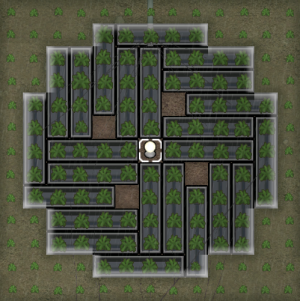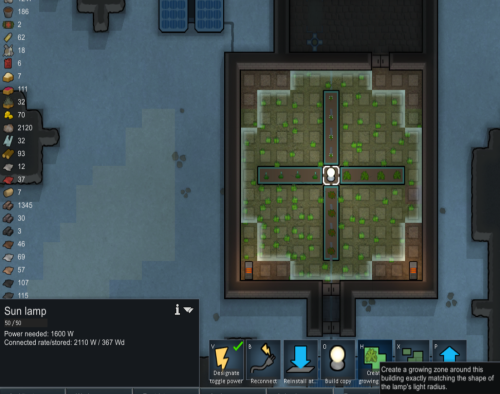Difference between revisions of "Sun lamp"
(Lead section doesn't need header. Minor rewrite.) |
|||
| (23 intermediate revisions by 13 users not shown) | |||
| Line 1: | Line 1: | ||
| − | |||
{{infobox main|furniture| | {{infobox main|furniture| | ||
|name = Sun lamp | |name = Sun lamp | ||
| Line 7: | Line 6: | ||
|type2 = | |type2 = | ||
|placeable = Yes | |placeable = Yes | ||
| − | |size = 1 | + | |size = 1 ˣ 1 |
|hp = 50 | |hp = 50 | ||
|power = - 2900 | |power = - 2900 | ||
| − | | | + | |work to make = 330 |
| − | | | + | |resources to make = {{icon|steel|40}} |
| + | |deconstruct yield = {{icon|steel|30}} | ||
|mass base = 4.5 | |mass base = 4.5 | ||
}} | }} | ||
| − | + | Sun lamps provide artificial light to roofed growing zones (greenhouses) at high power expense (2,900 watts). A sun lamp will illuminate tiles within a five-block radius at 100% and outside tiles at only 50% or less. Sun lamps automatically turn themselves off at night to save power while the plants are resting. This energy-use pattern means they can be efficiently powered by solar panels. Once installed, the lamp menu offers the option to create a growing zone that matches its radius. Sun lamps become available after [[research]]ing Electricity. | |
| − | |||
| − | |||
| − | |||
| − | + | === Short circuits === | |
| + | Rain on a powered sun lamp will cause short circuits and fires. A roof will prevent this. | ||
| + | If the area is unroofed, you can simply switch the sun lamp off. In biomes with a growing season, turning off the sunlamp and removing the the roof can help save power when the weather is warm. | ||
| + | |||
| + | == Greenhouses == | ||
| + | Sun lamps allow indoor growing but don't produce heat, so [[heater]]s may be required to attain proper conditions for plant growth. [[Events#Solar flare|Solar flares]] will cut the power, so prepare a [[shelf]] with emergency wood to build [[campfire]]s to keep the room temperature above -10C/14F (below which most plants will rapidly die). Double-width walls provide more insulation against temperature changes (and thus save power on [[heater]]s or [[cooler]]s), as well as offering better protection from attacks. | ||
| + | |||
| + | Sun lamps placed on dirt can let your colony produce things like corn or smokeleaf even during a toxic fallout, or in a cold biome with no growing season. If you maintain proper growing temperature, a dirt floor greenhouse will have 100% fertility on normal soil and 140% on fertile soil. Trees such as pine, birch, saguaro or cocoa trees cannot be grown in a greenhouse because they can't be planted under a roof. | ||
| + | |||
| + | [[Hydroponics basin]]s boost plant growth to 280% speed and do not require soil. However, they can only grow certain crops and are dependent on electricity. If a hydroponics basin loses power, all plants on it will die quickly. The configuration in the image below will fit 24 hydroponics basins under a single sunlamp. | ||
| + | |||
| + | [[File:SunlampHydroponics.png|frameless]] | ||
| + | |||
| + | If you have [[Biofuel_refinery|biofuel refining]] researched, you can use food produced by hydroponics to fuel chemfuel generators to help power the greenhouse array. This is so efficient that it violates thermodynamics, and leaves you with spare food for your colonists as well. | ||
| + | |||
| + | In 1.0 you need to place the sun lamp's growing zone manually. It can be made as a plus sign (+) in which each line is 5 tiles wide by 11 tiles long, with a 9 by 9 square in the middle. You can use the Planning tool to map this zone before placing your sun lamp. | ||
| + | |||
| + | The lamp blueprint will show the outline of its light radius until it is placed. Once the blueprint has been placed, the light radius won't be visible again until the lamp has been built. | ||
| + | |||
| + | |||
| + | === Legacy controls === | ||
| + | |||
| + | In previous versions of the game, the sun lamp menu allowed you to automatically create a growing zone within its light radius. | ||
| + | |||
| + | [[File:Sun lamp H.png|500px]] | ||
{{nav|furniture|wide}} | {{nav|furniture|wide}} | ||
[[Category:Furniture]] | [[Category:Furniture]] | ||
[[Category:Food]] | [[Category:Food]] | ||
Revision as of 05:38, 6 September 2020
Sun lamp
Sun lamps provide artificial light to roofed growing zones (greenhouses) at high power expense (2,900 watts). A sun lamp will illuminate tiles within a five-block radius at 100% and outside tiles at only 50% or less. Sun lamps automatically turn themselves off at night to save power while the plants are resting. This energy-use pattern means they can be efficiently powered by solar panels. Once installed, the lamp menu offers the option to create a growing zone that matches its radius. Sun lamps become available after researching Electricity.
Short circuits
Rain on a powered sun lamp will cause short circuits and fires. A roof will prevent this.
If the area is unroofed, you can simply switch the sun lamp off. In biomes with a growing season, turning off the sunlamp and removing the the roof can help save power when the weather is warm.
Greenhouses
Sun lamps allow indoor growing but don't produce heat, so heaters may be required to attain proper conditions for plant growth. Solar flares will cut the power, so prepare a shelf with emergency wood to build campfires to keep the room temperature above -10C/14F (below which most plants will rapidly die). Double-width walls provide more insulation against temperature changes (and thus save power on heaters or coolers), as well as offering better protection from attacks.
Sun lamps placed on dirt can let your colony produce things like corn or smokeleaf even during a toxic fallout, or in a cold biome with no growing season. If you maintain proper growing temperature, a dirt floor greenhouse will have 100% fertility on normal soil and 140% on fertile soil. Trees such as pine, birch, saguaro or cocoa trees cannot be grown in a greenhouse because they can't be planted under a roof.
Hydroponics basins boost plant growth to 280% speed and do not require soil. However, they can only grow certain crops and are dependent on electricity. If a hydroponics basin loses power, all plants on it will die quickly. The configuration in the image below will fit 24 hydroponics basins under a single sunlamp.
If you have biofuel refining researched, you can use food produced by hydroponics to fuel chemfuel generators to help power the greenhouse array. This is so efficient that it violates thermodynamics, and leaves you with spare food for your colonists as well.
In 1.0 you need to place the sun lamp's growing zone manually. It can be made as a plus sign (+) in which each line is 5 tiles wide by 11 tiles long, with a 9 by 9 square in the middle. You can use the Planning tool to map this zone before placing your sun lamp.
The lamp blueprint will show the outline of its light radius until it is placed. Once the blueprint has been placed, the light radius won't be visible again until the lamp has been built.
Legacy controls
In previous versions of the game, the sun lamp menu allowed you to automatically create a growing zone within its light radius.


